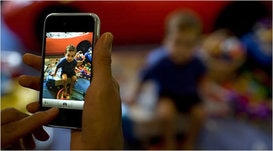Story telling is such an important part of your child’s life. Think of all the times you’ve asked your child, “What did you do today?” and they’ve replied with “Nothing.” or “I don’t know.” or had no response at all. As your child gets older, the ability to tell stories gets increasingly important.
At The Speech Space, we often hear from parents who want to help develop their child’s story telling skills, so here are some fun and easy ways you can help your child develop this skill.

1. Take pictures:
Although this may not be possible to do during school days, weekends are a great time to use our handy iPhones to work on story telling. Use your phone to take pictures throughout a day you spend with your child. At the end of the day, have them go through the pictures and describe the activities. Your activities can be exciting adventures or everyday activities like making breakfast together or brushing teeth. Added bonus- you’ll have lots of pictures for your memory books!

2. Have your child tell you how to do a familiar activity:
Most children’s days are based in routine- morning routines, hand washing routines, food routines, bedtime routines- which should be very easy for your child to retell, as they do them every day. Children love to “be the grown up,” so have your child tell you how wash your hands or make their snack. Try to use key words like “first/then/last” or “first/next/last” to help your child become familiar with them in sequence.

3. Act out a familiar story: Does your child love to read some of the same stories over and over again? If so, try to gather some dress up items or use their toy figures to act out the story. You can start by letting your child use the book to help them remember how the story goes, but try working up to them acting out the story without help from you or the book. Demonstrate how you would act out or tell the story and use an expressive voice and face, or over exaggerated movements. Kids love seeing adults get silly, so have fun and make it a great performance

4. Wordless books: While most books have words, there are some that have few to no words in them (Flashlight, Frog Where Are you?, Pancakes for Breakfast, Red Sled). These books are great for young children for several reasons, including story telling. Since the books have no words, it’s easy for your child to use the pictures to help them make up their own story while having a visual guide to keep them on topic. Make sure that your child is using the pictures to help them with their story, using specific vocabulary and staying on topic.These wordless books are also great to focus on details of what is happening in order to make inferences and predictions about the pictures or stories.
As your child grows and moves through school these skills become more and more vital. In their early years, family or teachers may ask what your child did over the weekend or holiday. As they continue through school, your child will be expected to retell stories that are read to them or recall activities from earlier in their day. When your child begins writing tasks, they will be expected to write a cohesive story with a beginning, middle, and end.
Incorporating story telling and sequencing skills into daily routines and activities you already do, makes it easier to work on these skills. We are all about making it as easy as possible to improve your child’s communication skills!
If you have questions or concerns about your child’s development, contact us at The Speech Space. We offer free screenings, which take approximately 30 minutes, and can help identify potential problems.
